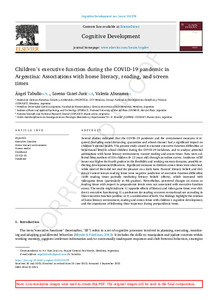Por favor, use este identificador para citar o enlazar este ítem:
https://repositorio.uca.edu.ar/handle/123456789/17420| Título: | Children’s executive function during the COVID -19 pandemic in Argentina : associations with home literacy , reading , and screen times | Autor: | Tabullo, Angel Canet Juric, Lorena Abusamra, Valeria |
Palabras clave: | PANDEMIA; COVID-19; INFANCIA; NIÑOS; ALFABETIZACION; LECTURA; TIEMPOS DE PANTALLA; FUNCIONES EJECUTIVAS | Fecha de publicación: | 2023 | Editorial: | Elsevier | Cita: | Tabullo, A., Canet Juric, L., Abusamra, V. Children’s executive function during the COVID -19 pandemic in Argentina : associations with home literacy , reading , and screen times [en línea]. Cognitive Development. 2023, 68. doi: 10.1016/j.cogdev.2023.101378. Disponible en: https://repositorio.uca.edu.ar/handle/123456789/17420 | Resumen: | Abstract: Several studies indicated that the COVID-19 pandemic and the containment measures it required (including social distancing, quarantine and school closure) had a significant impact on children’s mental health. The present study aimed to examine executive function difficulties at behavioural level in school children during the COVID-19 lockdown, and to analyze potential associations with home literacy environment, current reading and screen times. Data were collected from mothers of 210 children (9–12 years old) through an online survey. Incidence of EF issues was higher for fourth graders in the flexibility and working memory domains, possibly reflecting developmental differences. Significant increases in children screen times were observed, while most of them did not read for pleasure on a daily basis. Parents’ literacy beliefs and children’s current leisure reading times were negative predictors of executive function difficulties (with reading times partially mediating literacy beliefs’ effects), which increased with videogame times (particularly in 4th graders). Nevertheless, perceived changes on screen or reading times with respect to prepandemic levels were not associated with executive function scores. The results might indicate: 1) opposite effects of literacy and video game times over children’s executive functioning; 2) a preference for reading or screen recreational use according to their executive function profiles; or 3) a combination of both. Our findings highlight the relation of home literacy environment, reading and screen times with children’s cognitive development, and the importance of following their trajectory during postpandemic times. | Cobertura Espacial: | Argentina | Cobertura Temporal: | Siglo XXI | URI: | https://repositorio.uca.edu.ar/handle/123456789/17420 | ISSN: | 0885-2014 1879-226X (online) |
Disciplina: | EDUCACION | DOI: | https://doi.org/10.1016/j.cogdev.2023.101378 | Derechos: | Acceso abierto | Fuente: | Cognitive Development. Vol. 68, 2023 |
| Aparece en las colecciones: | Artículos |
Ficheros en este ítem:
| Fichero | Descripción | Tamaño | Formato | |
|---|---|---|---|---|
| childrens-executive-function.pdf | 717,66 kB | Adobe PDF |  Visualizar/Abrir |
Visualizaciones de página(s)
42
comprobado en 27-abr-2024
Descarga(s)
64
comprobado en 27-abr-2024
Google ScholarTM
Ver en Google Scholar
Altmetric
Altmetric
Este ítem está sujeto a una Licencia Creative Commons

